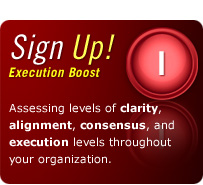May 5th, 2007
by Dr. Brian Higley |
A big question on many people’s minds is how to balance planning with getting the plan done. Here are my thoughts on the matter:
It’s been my experience that successful leaders tend to lay down their strategy 1-4 times a year to avoid making teammates’ heads spin as they change directions every couple of weeks. They then spend about 2-4 hours every 2-4 weeks on clarifying that strategy to their people and identifying any major barriers to executing the tactics necessary to fulfilling their strategic aims.
My experience is that, if this process is done well, there is a lot of time left to focus on assisting key team members with executing their strategies. Unfortunately, it’s also been my experience that this process is NOT often done very well (probably about 10% of the leaders my team knows does it at a consistently high level).”
May 5th, 2007
by Dr. Brian Higley |
I was recently asked to answer the following question (and thought it might be good to post the answer for others to have a look at): “How do you effectively integrate strategic and tactical planning?”
After researching this important question over the past 8 years now (and sifting through the myriad of answers that people, books, DVDs, etc. put forth), I think that the most successful leaders integrate strategy with their tactics in a very simple, but powerful way. I’ve found that they perform the following steps on a regular basis to integrate their strategy with their tactics:
(more…)
April 12th, 2007
by Dr. Brian Higley |
I’m actually not going to write anything about Self-Mastery here. Before you click away from this article in disgust, let me first tell you why I’m not writing about it and what I’m doing instead. I’ve heard so many leaders say “I know, I know” when someone recommends consistently prioritizing their goals and activities – and continuously fail to do consistent prioritization – that I’ve learned that writing/talking about it isn’t all that helpful to anyone.
So, instead of writing/talking about it more, our team has created a system to assist leaders in actually doing the things that will help them to increase their Self-Mastery. We call this the “Self-Mastery Boost Support System (SBSS).” For a free sample of the first 15-minute assessment in this system, click here and follow the instructions carefully.
To learn more about this system, feel free to contact me at BrianH@TBB2Excellence.com.
Click here to view full Self-Mastery article
April 12th, 2007
by Dr. Brian Higley |
Having covered our definition of Self-Mastery, let’s turn to the results of our recent Self-Mastery poll. We had a variety of people in a variety of different roles chime in. Forty-eight participants identified themselves as “leaders” (those who are often involved in strategic planning), 24 individuals identified as “managers” (often involved with organizing others toward executing plans), and 17 individuals identified as “employees” (often involved in executing plans) – with 6 individuals identifying themselves as fulfilling multiple roles.
We also had a variety of different responses in relation to how long participants were at their current positions within their current organizations, with about 25% of the individuals reporting being in their current positions and at their current organizations for under 1 year, 50% of the individuals reporting being at their current organizations and in their current positions between 1-10 years, and 25% reporting being at their current positions in their current organizations for over 10 years.
Click here to view full Self-Mastery article
April 12th, 2007
by Dr. Brian Higley |
I’ve been asked multiple times about Self-Mastery: for the past 10 years, our firm has been studying the strongest factors associated with Self-Mastery and training individuals in how to attain more of it. Of course, in order to study a concept, it is important to define that concept first. Self-Mastery, to us, is the ability to exhibit strong influence over one’s thoughts, feelings, and behaviors.
Many people we’ve talked to use the term “control” of self when talking about Self-Mastery (instead of our preferred term: “strong influence” with one’s self). The way we see it, complete control over one’s thoughts, feelings, and behaviors would make one robot-like, while being able to strongly influence ourselves on a regular basis allows for both Self-Mastery and spontaneous, creative, “uncontrolled” thoughts, emotions and behaviors. Complete control over oneself, we think, would make for a boring, restricted life!
Click here to view full Self-Mastery article


